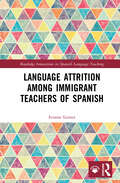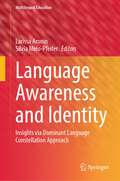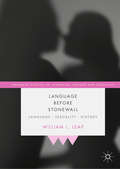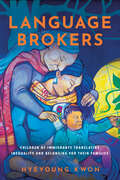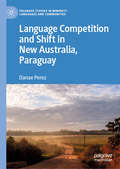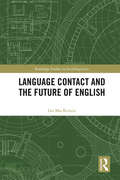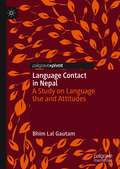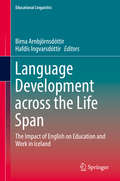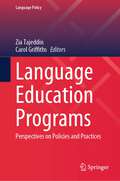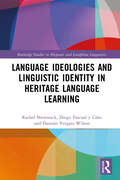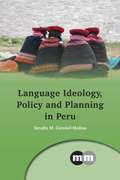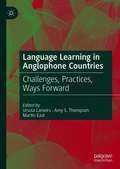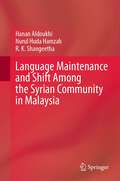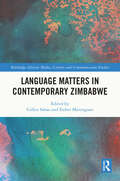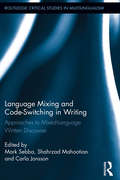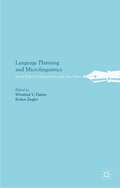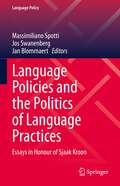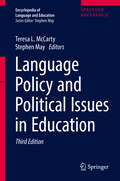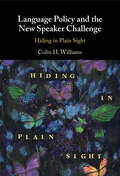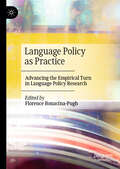- Table View
- List View
Language Attrition among Immigrant Teachers of Spanish (Routledge Innovations in Spanish Language Teaching)
by Ivonne LernerLanguage Attrition among Immigrant Teachers of Spanish is the first book devoted entirely to Spanish language attrition in all language areas and specifically among language professionals.Based on original research awarded the ASELE-Routledge prize in 2022, this volume presents an interdisciplinary and pioneering study on native language attrition among Spanish L1 immigrants in Israel, though its insights can be easily applied in any immigration setting. It focuses on the challenges faced by immigrant foreign-language instructors teaching their L1 (first language). Integrating both quantitative and qualitative data, the study explores Spanish language attrition in a multilingual and multicultural context like Israel, offering innovative insights and suggestions for future research. Language Attrition among Immigrant Teachers of Spanish also contributes to the native/non-native language teacher debate from the unique perspective of attrition, proposing a workshop for teachers alongside its research findings.This volume is an essential resource for researchers and postgraduate students of applied linguistics with a specific interest in language attrition or sociolinguistics. It will also be of interest to foreign language teachers and teacher trainers.
Language Awareness and Identity: Insights via Dominant Language Constellation Approach (Multilingual Education #45)
by Larissa Aronin Sílvia Melo-PfeiferThis volume offers a unique insight into multilingualism and sociolinguistic diversity employing the dominant language constellation (DLC) approach. How can novel research inform teaching practices? How do current theories account for multilingual reality in settings as diverse as countries of Western and Eastern Europe and Tunisia and Maghreb? The volume deals with issues of plurilingual identity of teachers and multilingual learners and examines the issues of foreign language teaching both in contexts perceived as monolingual and multilingual Drawing on the intersection of analytic categories such as language repertoire, translanguaging, visuality and narratives, it particularly emphasizes the connections between DLCs, language awareness and identity. The contributors demonstrate how formal language teaching can capitalize on the DLC paradigm and how teacher education programs can use it both as a framework to discuss and as a tool to enhance teacher education and professional development.This volume on DLC as an approach to exploring facets of language awareness and identity presents a very welcome contribution to the study of multilingualism as a complex and dynamic phenomenon. The studies stemming from a range of mainly educational settings in different countries will definitely enhance our thinking perspectives in an area of research with increasing interest. Prof. Dr. Ulrike Jessner, University of Innsbruck (Austria) and University of Pannonia (Hungary)
Language Before Stonewall: Language, Sexuality, History (Palgrave Studies in Language, Gender and Sexuality)
by William L. LeapThis book explores the linguistic and social practices related to same-sex desires and identities that were widely attested in the USA during the years preceding the police raid on the Stonewall Inn in 1969. The author demonstrates that this language was not a unified or standardized code, but rather an aggregate of linguistic practices influenced by gender, racial, and class differences, urban/rural locations, age, erotic desires and pursuits, and similar social descriptors. Contrary to preconceptions, moreover, it circulated widely in both public and in private domains. This intriguing book will appeal to students and academics interested in the intersections of language, sexuality and history and queer historical linguistics.
Language Brokers: Children of Immigrants Translating Inequality and Belonging for Their Families (Articulations: Studies in Race, Immigration, and Capitalism)
by Hyeyoung KwonIn a nation lacking a comprehensive social safety net, people often scramble to find private solutions to structural problems. While existing scholarship primarily focuses on how adults, particularly mothers, navigate systematic gaps in social support, Language Brokers shifts our attention to bilingual children securing crucial resources for their families. Drawing upon interviews with working-class Mexican and Korean American language brokers, as well as healthcare providers, and months of participant observation in a Southern California police station, Hyeyoung Kwon reveals how children of immigrants translate more than simple verbal exchanges. Living at the intersection of multiple forms of inequality, these youth creatively use their in-between status to resolve structural problems to ensure their families' basic citizenship rights are upheld in interactions with teachers, social workers, landlords, doctors, and police officers. In an era of widespread racialized nativism, Language Brokers provides a critical examination of American culture, laying bare the contradictions between the ideals of equality and the exclusion of immigrants. Kwon underscores that dichotomous and racialized understandings of "deserving" and "undeserving" immigrants—which are embedded in everyday interactions and institutional practices—inform the routine ways in which immigrant youth attempt to cultivate belonging for their families.
Language Competition and Shift in New Australia, Paraguay (Palgrave Studies in Minority Languages and Communities)
by Danae PerezThis book is an innovative sociolinguistic study of New Australia, an Australian immigrant community in Paraguay in 1893, whose descendants today speak Guarani. Providing fresh data on a previously under-researched community who are an extremely rare case of language shifting from English heritage language to a local indigenous language, the case study is situated within the wider context of the colonial and post-colonial spread of English in Latin America over the past century. Drawing on insights from linguistic anthropology, sociolinguistics, Latin American studies and history, the author presents the history of the colony before closely analysing the interplay of language and identity in this uniquely diasporic setting. This book fills a longstanding gap in the World Englishes and heritage languages literature, and it will be of interest to scholars of colonial and postcolonial languages, and minority language more generally.
Language Contact and the Future of English (Routledge Studies in Sociolinguistics)
by Ian MackenzieThis book reflects on the future of the English language as used by native speakers, speakers of nativized New Englishes, and users of English as a lingua franca (ELF). The volume begins by outlining the current position of English in the world and accounts for the differences among native and nativized varieties and ELF usages. It offers a historical perspective on the impact of language contact on English and discusses whether the lexicogrammatical features of New Englishes and ELF are shaped by imperfect learning or deliberate language change. The book also considers the consequences of writing in a second language and questions the extent to which non-native English-speaking academics and researchers should be required to conform to ‘Anglo’ patterns of text organization and ‘English Academic Discourse.’ The book then examines the converse effect of English on other languages through bilingualism and translation. This volume is essential reading for students and scholars in English language, sociolinguistics, language acquisition, and language policy.
Language Contact in Nepal: A Study on Language Use and Attitudes
by Bhim Lal GautamThis book examines language contact and shift in Nepal, a multilingual context where language attitudes and policies often reflect the complex socio-cultural and socio-political relationship between minority, majority and endangered languages and peoples. Presenting the results of a 15-year study and making use of both quantitative and qualitative data, the author presents evidence relating to speakers' opinions and perceptions of mother tongues including English, Hindi, Nepali, Sherpa, Dotyali, Jumli and Tharu. This book explores an under-studied part of the world, and the findings will be relevant to scholars working in other multilingual contexts in fields including language policy and planning, language contact and change, and language attitudes and ideologies.
Language Debates: Theory and Reality in Language Learning, Teaching and Research (Language Acts and Worldmaking #1)
by VariousThis book captures an urgent moment for language teaching, learning and research. At its core are a series of debates concerning gender stereotyping, the place of linguistics in modern languages, language activism, multilingualism and modern languages and digital humanities. Taken together, these debates explore the work that languages, and that those who learn and speak them, do in the world as well as the way we think 'through' and 'in' a language and are shaped by it. Language Debates acknowledges the history of language teaching and the current realities of language teaching and learning. It is bold in suggesting ways forward for reform and for policy, setting languages and language learning at the heart of a consciously transformative set of goals. This book is therefore essential reading for academics, language teachers, policy makers, students, activists and those passionate about progressing language learning and teaching. The editors and contributors make up a multilingual and multicultural team who work across languages, cultures and borders with a globally-informed approach to their work. Uniquely, the debates in this volume are based on events with participants in the Language Acts and Worldmaking Debates Series and/or workshops within the wider research project and take into account the ensuing discussions there. Each debate is accompanied by an interview which serves as a model on how to continue the conversation beyond the printed pages of the book. You can also discover ways to join the debate through links on the Language Acts and Worldmaking series website (www.jmlanguages.com/languageacts) which includes recorded debates, additional materials and more information about the series. Like all the volumes in the Language Acts and Worldmaking series, the overall aim is two-fold: to challenge widely-held views about language learning as a neutral instrument of globalisation and to innovate and transform language research, teaching and learning, together with Modern Languages as an academic discipline, by foregrounding its unique form of cognition and critical engagement. Specific aims are to:· propose new ways of bridging the gaps between those who teach and research languages and those who learn and use them in everyday contexts from the professional to the personal· put research into the hands of wider audiences · share a philosophy, policy and practice of language teaching and learning which turns research into action· provide the research, experience and data to enable informed debates on current issues and attitudes in language learning, teaching and research· share knowledge across and within all levels and experiences of language learning and teaching· showcase exciting new work that derives from different types of community activity and is of practical relevance to its audiences · disseminate new research in languages that engages with diverse communities of language practitioners.
Language Debates: Theory and Reality in Language Learning, Teaching and Research (Language Acts and Worldmaking #1)
by VariousThis book captures an urgent moment for language teaching, learning and research. At its core are a series of debates concerning gender stereotyping, the place of linguistics in modern languages, language activism, multilingualism and modern languages and digital humanities. Taken together, these debates explore the work that languages, and that those who learn and speak them, do in the world as well as the way we think 'through' and 'in' a language and are shaped by it. Language Debates acknowledges the history of language teaching and the current realities of language teaching and learning. It is bold in suggesting ways forward for reform and for policy, setting languages and language learning at the heart of a consciously transformative set of goals. This book is therefore essential reading for academics, language teachers, policy makers, students, activists and those passionate about progressing language learning and teaching. The editors and contributors make up a multilingual and multicultural team who work across languages, cultures and borders with a globally-informed approach to their work. Uniquely, the debates in this volume are based on events with participants in the Language Acts and Worldmaking Debates Series and/or workshops within the wider research project and take into account the ensuing discussions there. Each debate is accompanied by an interview which serves as a model on how to continue the conversation beyond the printed pages of the book. You can also discover ways to join the debate through links on the Language Acts and Worldmaking series website (www.jmlanguages.com/languageacts) which includes recorded debates, additional materials and more information about the series. Like all the volumes in the Language Acts and Worldmaking series, the overall aim is two-fold: to challenge widely-held views about language learning as a neutral instrument of globalisation and to innovate and transform language research, teaching and learning, together with Modern Languages as an academic discipline, by foregrounding its unique form of cognition and critical engagement. Specific aims are to:· propose new ways of bridging the gaps between those who teach and research languages and those who learn and use them in everyday contexts from the professional to the personal· put research into the hands of wider audiences · share a philosophy, policy and practice of language teaching and learning which turns research into action· provide the research, experience and data to enable informed debates on current issues and attitudes in language learning, teaching and research· share knowledge across and within all levels and experiences of language learning and teaching· showcase exciting new work that derives from different types of community activity and is of practical relevance to its audiences · disseminate new research in languages that engages with diverse communities of language practitioners.
Language Development across the Life Span
by Birna Arnbjörnsdóttir Hafdís IngvarsdóttirThis book offers insights from a seven-year study into the impact of English as an International Language at a national level, from the effect of rich English input on a previously monolingual people’s linguistic repertoire to its effect on the situated language use demanded of speakers who find themselves in a new linguistic environment for which they have not been prepared. The changes described in the book have occurred in a speech community that identifies strongly with the local language, but finds itself increasingly having to use another language to perform daily functions in education and work. Findings describe how the official language and educational policies have not addressed this new linguistic ecology of Iceland. The findings of these studies have larger international practical, educational, empirical, and theoretical implications and should be relevant to anyone interested in in the impact of English as an International Language.
Language Disorders in Children: Fundamental Concepts of Assessment and Intervention
by Joan N. Kaderavek Victoria S. HenbestNow published by Plural, this modernized third edition of Language Disorders in Children: Fundamental Concepts of Assessment and Intervention offers a comprehensive overview of language disorders in children for speech-language pathology students. <P><P>The expert authors bring together decades of clinical experience and pedagogical expertise to create a comprehensive resource with instructional strategies and clinical applications, enhanced with numerous activities, discussions, and case studies that promote critical thinking. <P><P>This edition introduces a groundbreaking model that utilizes a story-based approach to explain the dimensions of choosing and developing interventions. This method engages students in a thought experiment that illuminates the nuances of clinical decision-making, particularly for children with developmental language disorder, autism, and other developmental disabilities. The book revisits and expands upon the well-regarded five communication subdomains framework, providing a clear and structured approach to understanding language development from early pragmatic skills to advanced discourse.
Language Education Programs: Perspectives on Policies and Practices (Language Policy #34)
by Carol Griffiths Zia TajeddinThis book delves into the realm of effective language education programs, examining them from both macro and micro-policy-making perspectives. It unravels the distinguishing features of exemplary language programs and explores how these programs are implemented in diverse international contexts. The book comprehensively explores various facets of language education programs, encompassing well-crafted language education policies, robust curriculum and syllabus design, impactful teaching materials, effective approaches to English for specific purposes (ESP), English as a medium of instruction (EMI), content and language integrated learning (CLIL), and English as a Lingua Franca (ELF)-informed instruction. The book also delves into fruitful school/institute-university partnerships, the judicious use of technology, strategies for teacher recruitment and professional development, as well as efficient policies for learner assessment, among other topics of significance. The contributions within this book are firmly grounded in data, incorporating findings from empirical studies. The insights provided draw upon valuable data obtained from a range of diverse contexts in which effective language education programs have been implemented.
Language Ideologies and Linguistic Identity in Heritage Language Learning (Routledge Studies in Hispanic and Lusophone Linguistics)
by Rachel Showstack Diego Pascual y Cabo Damián Vergara WilsonLanguage Ideologies and Linguistic Identity in Heritage Language Learning addresses the ways in which discourses about language value and identities of linguistic expertise are constructed and negotiated in the Spanish heritage language (HL) classroom, and how the classroom discourse shapes, and is shaped by, the world outside of the classroom.The volume examines the sociopolitical contexts, personal histories, and communicative practices of Spanish teachers and students in two diverse geographic regions: the US states of Texas and Kansas. Adopting an integrated sociocultural approach, it considers the ways in which individuals draw from multiple linguistic resources and social practices in daily interaction and how they articulate their beliefs about language through storytelling. Rich interactional data, examples from social media, and stories of community engagement are utilized to demonstrate how Spanish heritage speakers use language creatively and proactively to legitimize and claim power in their home and community linguistic practices.This is an invaluable resource for applied linguists who seek to better understand the relationship between language, ideology, and identity and for graduate students and researchers in the fields of linguistics, Spanish, and HL education.
Language Ideology, Policy and Planning in Peru
by Serafín M. Coronel-MolinaThis book explores the role of language academies in preserving and revitalizing minority or endangered languages. The author studies the controversial High Academy of the Quechua Language (HAQL) in Peru, the efficacy of which has been questioned by some experts. The book delves into the positions, attitudes, ideologies and practices of the HAQL and the role it has played in language policy and planning in the Andean region. The author uses ethnographic fieldwork to support what was previously only anecdotal evidence from individuals viewing the Academy from the outside. This book would appeal to anyone studying the sociolinguistics of the Quechua language, as well as to those studying broader issues of Indigenous language policy and planning, maintenance and revitalization.
Language Learning in Anglophone Countries: Challenges, Practices, Ways Forward
by Martin East Ursula Lanvers Amy S. ThompsonThis edited book focuses on the state of language learning in Anglophone countries and brings together international research from a wide range of educational settings. Taking a contextual perspective on the language learning crisis currently facing Anglophone countries, the authors examine systemic challenges, real-world practices, and broader cultural trends that have an impact on the uptake of modern foreign languages in different Anglophone settings. This book will be of interest to scholars working in applied linguistics and language education, particularly those with a focus on educational policy and Global English.
Language Machines: Cultural AI and the End of Remainder Humanism (Posthumanities #74)
by Leif WeatherbyHow generative AI systems capture a core function of language Looking at the emergence of generative AI, Language Machines presents a new theory of meaning in language and computation, arguing that humanistic scholarship misconstrues how large language models (LLMs) function. Seeing LLMs as a convergence of computation and language, Leif Weatherby contends that AI does not simulate cognition, as widely believed, but rather creates culture. This evolution in language, he finds, is one that we are ill-prepared to evaluate, as what he terms &“remainder humanism&” counterproductively divides the human from the machine without drawing on established theories of representation that include both. To determine the consequences of using AI for language generation, Weatherby reads linguistic theory in conjunction with the algorithmic architecture of LLMs. He finds that generative AI captures the ways in which language is at first complex, cultural, and poetic, and only later referential, functional, and cognitive. This process is the semiotic hinge on which an emergent AI culture depends. Weatherby calls for a &“general poetics&” of computational cultural forms under the formal conditions of the algorithmic reproducibility of language. Locating the output of LLMs on a spectrum from poetry to ideology, Language Machines concludes that literary theory must be the backbone of a new rhetorical training for our linguistic-computational culture.
Language Maintenance and Shift Among the Syrian Community in Malaysia
by Hanan Aldoukhi Nurul Huda Hamzah R. K. ShangeethaThis book investigates language choices in different domains among Syrian Arab Muslim families who came to Malaysia after war broke out in their country. It focuses on how Syrian Heritage Language (HL), Modern Standard Arabic (MSA), Classical Arabic (CA), and other languages that might be spoken by these families were maintained and/or shifted from the time these families came to Malaysia until the lockdown due to the COVID-19 pandemic. Most works on Syrian community in Malaysia are focused on social and humanitarian issues; none has explored how Syrians in Malaysia are managing their language use in connection with day-to-day communication and integration. As the Syrian community in Malaysia adapts by learning the host language, their mother language/s might experience a shift. The way the minority communities view their mother language by prioritizing or deprioritizing its use in the family milieu are factors that contribute to language maintenance and language shift (LMLS). As such, this book provides insights on how Syrian parents are managing their own and their children’s language/s, along with the language of the host country.
Language Matters in Contemporary Zimbabwe (Routledge African Media, Culture and Communication Studies)
by Esther Mavengano Collen SabaoSpeaking to a broader global preoccupation with the state of languages and language development, this book considers issues surrounding the diverse languages, linguistic communities, and cultures of Zimbabwe.Reflecting on Shona, Xitsonga, Sotho, Xhosa, Tjwao, Nambya, IsiNdebele, Nyanja, Tshivenda, English and Braille, the book uncovers both the internal and external factors that impact language structures, language use and language ideologies across the country. The book considers how colonial legacies and contemporary language domination and minoritisation have led to language endangerment. It considers the fate of communities whose languages are marginalised and, in the process, poses questions on what can and should be done to preserve Zimbabwean languages. The authors' offerings range across subjects as diverse as music, linguistic innovation, education, human rights, literature, language politics and language policy, in order to build a rich and nuanced picture of language matters in the country.Coming at a critical moment of increasing mobility, migration, cultural plurality and globalisation, this book will be an important resource for researchers across African literature, linguistics, communication, policy and politics.
Language Mixing and Code-Switching in Writing: Approaches to Mixed-Language Written Discourse (Routledge Critical Studies in Multilingualism)
by Mark Sebba Shahrzad Mahootian Carla Jonsson"Code-switching," or the alternation of languages by bilinguals, has attracted an enormous amount of attention from researchers. However, most research has focused on spoken language, and the resultant theoretical frameworks have been based on spoken code-switching. This volume presents a collection of new work on the alternation of languages in written form. Written language alternation has existed since ancient times. It is present today in a great deal of traditional media, and also exists in newer, less regulated forms such as email, SMS messages, and blogs. Chapters in this volume cover both historical and contemporary language-mixing practices in a large range of language pairs and multilingual communities. The research collected here explores diverse approaches, including corpus linguistics, Critical Discourse Analysis, literacy studies, ethnography, and analyses of the visual/textual aspects of written data. Each chapter, based on empirical research of multilingual writing, presents methodological approaches as models for other researchers. New perspectives developed in this book include: analysis specific to written, rather than spoken, discourse; approaches from the new literacy studies, treating mixed-language literacy from a practice perspective; a focus on both "traditional" and "new" media types; and the semiotics of both text and the visual environment.
Language Planning and Microlinguistics
by Winifred V. Davies Evelyn ZieglerWhilst earlier studies of language planning and of standardisation have tended to study macro processes such as top-down language revitalisation campaigns or language polices at government level, this volume is in line with more recent work aimed at bridging the macro and the micro levels by examining how the two interact and influence each other. The aim of the volume as a whole is to contribute to a better understanding of the motivations underlying language users' decisions to adopt or resist language norms and policies of various kinds in their daily life. The individual chapters cover seven countries - the Czech Republic, Denmark, France, Germany, Japan, Luxembourg and Switzerland - and deal with different sociolinguistic constellations, ranging from communities dealing with variation within one language to those looking for ways to manage a multilingual repertoire.
Language Planning and National Identity in Croatia
by Keith Langston Anita Peti-StantićFollowing the collapse of the former Yugoslavia, Croatian was declared to be a separate language, distinct from Serbian, and linguistic issues became highly politicized. This book examines the changing status and norms of the Croatian language and its relationship to Croatian national identity, focusing on the period after Croatian independence.
Language Policies and the Politics of Language Practices: Essays in Honour of Sjaak Kroon (Language Policy #28)
by Jan Blommaert Massimiliano Spotti Jos SwanenbergThis edited volume consists of chapters celebrating the career of scholar Sjaak Kroon, who has produced ground-breaking work in the field of ethnography of education, immigrant minority language teaching and language politics. The chapters cover the use of immigrant minority languages in education and the development of policies at all levels and across the globe in this sometimes over-policed field. It particularly focuses on language policy analysis in which both the top-down institutional and the bottom-up ethnographic dimensions are blended, and in which globalization is the main macro-perspective. The chapters describe sensitive tools for investigating, unravelling and understanding the grey space connecting formal language policies to informal politics and practices of language on the ground.
Language Policy and Political Issues in Education
by Teresa L. Mccarty Stephen MayLanguage has too often been studied in isolation from the social and political conditions in which it is used. The late David Corson, the General Editor of the first edition of the Encyclopedia of Language and Education, held the position that an acute understanding of theory was a necessary prerequisite for action, not an alternative to it, especially if one were hoping to change policies for the better. The contributions in this volume acknowledge the centrality of the politics of language, highlighting the importance of the social and political contexts of language policy and language education. This is one of ten volumes of the Encyclopedia of Language and Education. The Encyclopedia bears testimony to the dynamism and evolution of the language and education field, as it confronts the ever-burgeoning and irrepressible linguistic diversity and ongoing pressures and expectations placed on education around the world.
Language Policy and the New Speaker Challenge: Hiding in Plain Sight
by Colin H. Williams'New speakers' is a term used to describe those who have learnt a minority language not within their home or community settings, but through bilingual education, immersion or migration. Looking specifically at the impact of new speakers on language policy, this book provides an authoritative and detailed examination of minority language policy in Wales, Scotland, Ireland, the Basque Autonomous Community, Navarre, Catalonia and Galicia. Based on interviews with politicians, senior civil servants, academics and civil society activists, it assesses the extent to which interventions derived from a new speakers' perspective has been incorporated into official language practice. It describes several challenges faced by new speakers, before proposing specific recommendations on how to integrate them into established minority language communities. Shedding new light on the deeper issues faced by minority language communities, it is essential reading for students and researchers in sociolinguistics, language policy and planning, language education, bi- and multilingualism.
Language Policy as Practice: Advancing the Empirical Turn in Language Policy Research
by Florence Bonacina-PughThis edited book brings together original contributions from scholars working across Language Policy and Planning to advance the recent 'Empirical turn' that has taken place in the field. All the chapters in the volume show how Language Policy can be conceptualized 'as practice' in a variety of domains, ranging from the home to the workplace, schools, and higher education. The authors also suggest further theoretical, methodological, and empirical developments for the discipline in light of this epistemological shift. A Foreword and an Afterword shed light on the theoretical and empirical lineage of this volume and show how this book contributes to the humanization of Language Policy research. This book will be of interest to scholars and post-graduate students working across Language Policy and Planning, Language in Education Policy, and Family Language Policy, as well as those in adjacent fields including Education Policy, Classroom Discourse, Linguistic Anthropology, Sociologyof Education, and Multilingualism.
